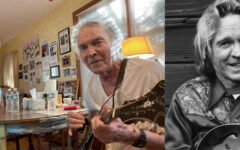
If digital recording sites had a bin for remainders—products that didn’t live up to the hype or sales—they’d be filled with projects by country stars who, for one reason or another, tried the bluegrass route at some point in their careers.
It’s usually not for lack of talent on the part of the carpetbaggers, but for not understanding that playing country music with bluegrass instruments doesn’t make the music bluegrass.
Vince Gill won’t have that problem when he comes back to bluegrass, which he says he will do at some point. “I was bluegrass first,” he reminds. “I’m part of the family.”
Don’t get too excited just yet. There’s no firm date for Gill’s return after several decades of country stardom and 21 Grammy awards. But the mere fact that he’s talking about it—as he did with me recently—is exciting news while fans wait for the new festival season to get into full swing.
“I’ve always kept my ear in the world of bluegrass,” Gill said during a recent phone call to talk about his guest slot on Darin and Brooke Aldridge’s latest CD, Faster and Farther. “I only got to spend couple of years (in the bluegrass world), but I always thought I’d come back and do another record. I still want to, and some day I will.”
Gill’s dabbling in bluegrass covered a chunk of the mid-1970s, including stints with Bluegrass Alliance, Boone Creek (with Ricky Skaggs) and Sundance, led by Byron Berline, before he hooked up with Pure Prairie League for a few years, then launched a long and fruitful solo career in country.
Gill gets why bluegrass audiences don’t go for imitators from the country world. He feels the same away about some of those projects. But he did offer some friendly advice for some of the self-appointed gatekeepers of bluegrass:
“I think it’d be much more beneficial if they were a little more accepting” of music that doesn’t fit a narrow definition of traditional bluegrass. “It reeks sometimes of arrogance. We all have our curmudgeon tendencies, but it’s got to change. It can’t be emulating somebody over and over.”
For his part, instead of limiting himself to chestnuts that have been cut over and over again, Gill said he wants “to try to write some new songs that sound old.”
But aside from dipping toe into the old “what’s bluegrass” argument, Gill had nice things to say about the bluegrass community. “I’ve always been impressed in bluegrass by how nice the people are,” he said. “I’m glad that’s how I grew up to be.”
With his typical brand of self-deprecating humor, he also noted that he’s fortunate to have found success: “I’m glad this all worked out, because I wasn’t very handy, and I’m allergic to hard work.”
I, for one, wish that Gill’s return to bluegrass had something firmer than “someday” in the equation. But that mere fact that there is an equation is, in itself, is worthy of a late-winter smile.







